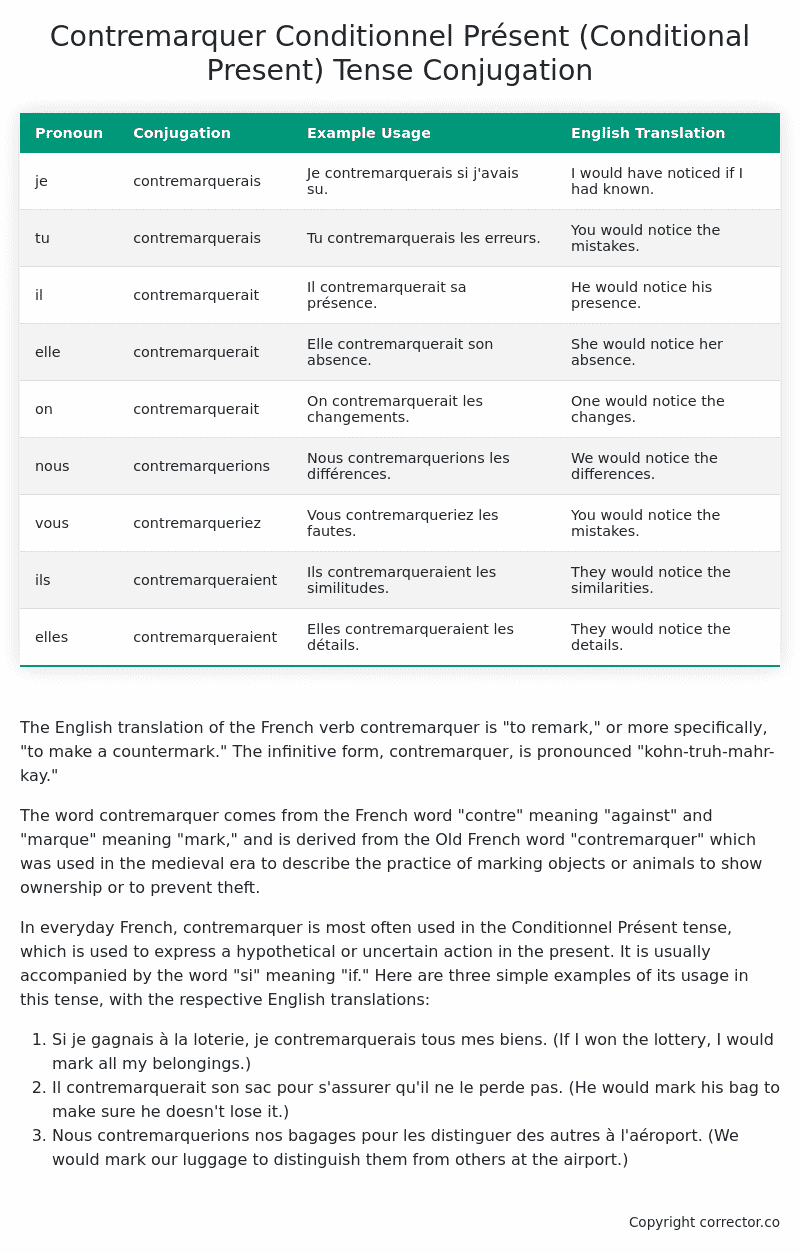Conditionnel Présent (Conditional Present) Tense Conjugation of the French Verb contremarquer
Introduction to the verb contremarquer
The English translation of the French verb contremarquer is “to remark,” or more specifically, “to make a countermark.” The infinitive form, contremarquer, is pronounced “kohn-truh-mahr-kay.”
The word contremarquer comes from the French word “contre” meaning “against” and “marque” meaning “mark,” and is derived from the Old French word “contremarquer” which was used in the medieval era to describe the practice of marking objects or animals to show ownership or to prevent theft.
In everyday French, contremarquer is most often used in the Conditionnel Présent tense, which is used to express a hypothetical or uncertain action in the present. It is usually accompanied by the word “si” meaning “if.” Here are three simple examples of its usage in this tense, with the respective English translations:
- Si je gagnais à la loterie, je contremarquerais tous mes biens. (If I won the lottery, I would mark all my belongings.)
- Il contremarquerait son sac pour s’assurer qu’il ne le perde pas. (He would mark his bag to make sure he doesn’t lose it.)
- Nous contremarquerions nos bagages pour les distinguer des autres à l’aéroport. (We would mark our luggage to distinguish them from others at the airport.)
Table of the Conditionnel Présent (Conditional Present) Tense Conjugation of contremarquer
| Pronoun | Conjugation | Example Usage | English Translation |
|---|---|---|---|
| je | contremarquerais | Je contremarquerais si j’avais su. | I would have noticed if I had known. |
| tu | contremarquerais | Tu contremarquerais les erreurs. | You would notice the mistakes. |
| il | contremarquerait | Il contremarquerait sa présence. | He would notice his presence. |
| elle | contremarquerait | Elle contremarquerait son absence. | She would notice her absence. |
| on | contremarquerait | On contremarquerait les changements. | One would notice the changes. |
| nous | contremarquerions | Nous contremarquerions les différences. | We would notice the differences. |
| vous | contremarqueriez | Vous contremarqueriez les fautes. | You would notice the mistakes. |
| ils | contremarqueraient | Ils contremarqueraient les similitudes. | They would notice the similarities. |
| elles | contremarqueraient | Elles contremarqueraient les détails. | They would notice the details. |
Other Conjugations for Contremarquer.
Le Present (Present Tense) Conjugation of the French Verb contremarquer
Imparfait (Imperfect) Tense Conjugation of the French Verb contremarquer
Passé Simple (Simple Past) Tense Conjugation of the French Verb contremarquer
Passé Composé (Present Perfect) Tense Conjugation of the French Verb contremarquer
Futur Simple (Simple Future) Tense Conjugation of the French Verb contremarquer
Futur Proche (Near Future) Tense Conjugation of the French Verb contremarquer
Plus-que-parfait (Pluperfect) Tense Conjugation of the French Verb contremarquer
Passé Antérieur (Past Anterior) Tense Conjugation of the French Verb contremarquer
Futur Antérieur (Future Anterior) Tense Conjugation of the French Verb contremarquer
Subjonctif Présent (Subjunctive Present) Tense Conjugation of the French Verb contremarquer
Subjonctif Passé (Subjunctive Past) Tense Conjugation of the French Verb contremarquer
Subjonctif Imparfait (Subjunctive Imperfect) Tense Conjugation of the French Verb contremarquer
Conditionnel Présent (Conditional Present) Tense Conjugation of the French Verb contremarquer (this article)
Conditionnel Passé (Conditional Past) Tense Conjugation of the French Verb contremarquer
L’impératif Présent (Imperative Present) Tense Conjugation of the French Verb contremarquer
L’infinitif Présent (Infinitive Present) Tense Conjugation of the French Verb contremarquer
Struggling with French verbs or the language in general? Why not use our free French Grammar Checker – no registration required!
Get a FREE Download Study Sheet of this Conjugation 🔥
Simply right click the image below, click “save image” and get your free reference for the contremarquer Conditionnel Présent tense conjugation!

Contremarquer – About the French Conditionnel Présent (Conditional Present) Tense
Formation
Common Everyday Usage Patterns
Expressing Polite Requests
Expressing Hypothetical Situations
Expressing Doubt or Uncertainty
Interactions with Other Tenses
Present Tense
Past Tense
Future Tense
Conditional Perfect
Summary
Want More?
I hope you enjoyed this article on the verb contremarquer. Still in a learning mood? Check out another TOTALLY random French verb conjugation!


